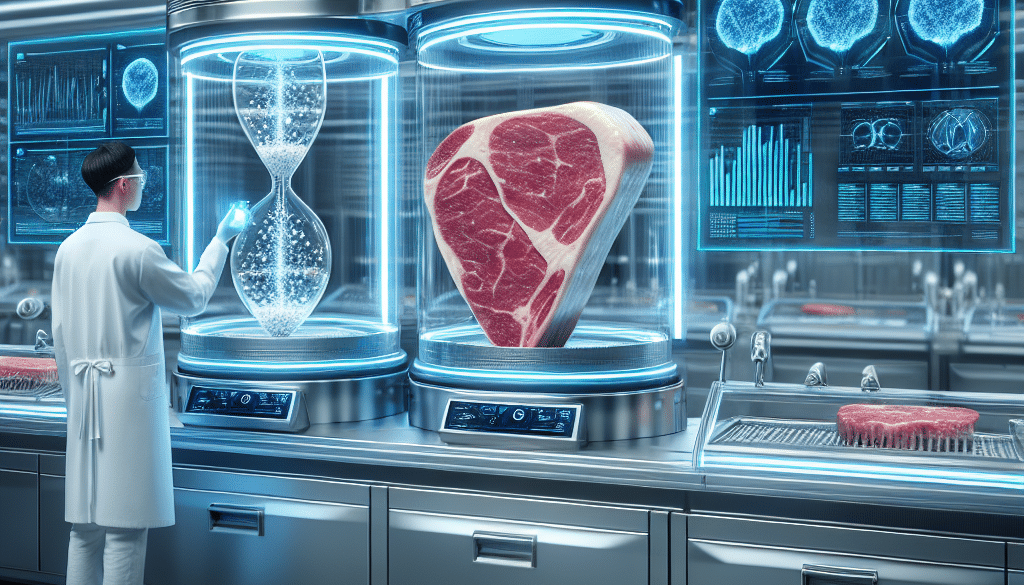Clean Meat: The Future of Lab-Grown Options
-
Table of Contents
- Clean Meat Revolution: Lab-Grown Options Shaping the Future
- Understanding Clean Meat
- The Benefits of Lab-Grown Meat
- Current State of the Clean Meat Industry
- Challenges Facing Lab-Grown Meat
- Case Studies and Statistics
- The Future of Clean Meat
- Conclusion
- Discover ETprotein’s Plant-Based Protein Products
Clean Meat Revolution: Lab-Grown Options Shaping the Future

The concept of clean meat, also known as cultured or lab-grown meat, has been a topic of considerable interest and debate in recent years. As the world grapples with the environmental, ethical, and health implications of traditional animal farming, clean meat presents a promising alternative that could revolutionize the way we think about and consume animal products. This article delves into the burgeoning industry of lab-grown meat, exploring its potential benefits, challenges, and the future it holds.
Understanding Clean Meat
Clean meat is produced by cultivating animal cells in a controlled environment, a process that eliminates the need to raise and slaughter animals. The technology behind clean meat involves taking a small sample of animal cells and providing them with the necessary nutrients, such as amino acids, sugars, and vitamins, in a bioreactor. These cells then multiply and differentiate to form muscle tissue, which is essentially the same as conventional meat.
The Benefits of Lab-Grown Meat
The advantages of clean meat are manifold, encompassing environmental, ethical, and health perspectives:
- Environmental Impact: Traditional livestock farming is a significant contributor to greenhouse gas emissions, deforestation, and water usage. Clean meat production requires substantially less land and water and generates lower emissions, making it a more sustainable option.
- Animal Welfare: Since clean meat does not involve raising and slaughtering animals, it addresses many of the ethical concerns associated with animal farming, including inhumane treatment and living conditions.
- Health Benefits: Lab-grown meat can be engineered to have a healthier fat profile and can be produced in sterile conditions, reducing the risk of foodborne illnesses and the need for antibiotics.
Current State of the Clean Meat Industry
The clean meat industry is still in its infancy, but it has made significant strides in recent years. Companies like Memphis Meats, Mosa Meat, and JUST Meat are leading the charge, having successfully produced various types of cultured meat, including beef, chicken, and seafood. The cost of production, however, remains a significant hurdle. The first lab-grown burger, created by Mosa Meat in 2013, cost $325,000 to produce. Since then, costs have plummeted, but clean meat is still more expensive than conventional meat.
Challenges Facing Lab-Grown Meat
Despite its potential, the clean meat industry faces several challenges:
- Scaling Production: Scaling up clean meat production to meet global demand is a complex challenge that requires significant technological advancements and investment.
- Regulatory Hurdles: Clean meat must navigate a complex regulatory landscape before it can be widely marketed and sold. Regulations vary by country and are still being developed in many regions.
- Consumer Acceptance: Convincing consumers to embrace lab-grown meat over traditional options is another hurdle. Taste, texture, and cultural perceptions of clean meat will play crucial roles in its acceptance.
Case Studies and Statistics
Several case studies highlight the progress and potential of clean meat. For instance, Singapore became the first country to approve the sale of lab-grown meat in 2020, with the company Eat Just selling cultured chicken nuggets. In terms of statistics, a study by AT Kearney predicts that by 2040, 35% of all meat consumed will be cultured.
The Future of Clean Meat
The future of clean meat is promising but contingent on overcoming the aforementioned challenges. Continued research and development, coupled with strategic partnerships and investments, will be crucial for the industry’s growth. As technology advances and production costs decrease, clean meat could become a staple in our diets, offering a sustainable and ethical alternative to traditional meat.
Conclusion
Clean meat represents a groundbreaking shift in food technology, with the potential to address some of the most pressing issues of our time. While challenges remain, the progress made thus far is encouraging. As the industry continues to evolve, it may not be long before lab-grown meat options are a common sight in grocery stores and on dinner plates around the world.
Discover ETprotein’s Plant-Based Protein Products
While the clean meat industry continues to grow, consumers looking for sustainable and ethical protein sources can explore ETprotein’s range of plant-based protein products. ETprotein offers a variety of high-quality, organic bulk vegan proteins that are non-GMO and allergen-free, catering to diverse dietary needs and preferences.
Whether you’re a manufacturer, distributor, or consumer interested in plant proteins for food and beverage, sports nutrition, or health and wellness products, ETprotein provides a comprehensive solution to meet your protein requirements. With a commitment to quality and customer satisfaction, ETprotein stands as a leader in the plant protein market.
About ETprotein:
ETprotein, a reputable plant protein vegan protein Chinese factory manufacturer and supplier, is renowned for producing, stocking, exporting, and delivering the highest quality organic bulk vegan protein and plant proteins. They include Organic rice protein, clear rice protein, pea protein, clear pea protein, watermelon seed protein, pumpkin seed protein, sunflower seed protein, mung bean protein, peanut protein etc. Their offerings, characterized by a neutral taste, non-GMO, allergen-free attributes, cater to a diverse range of industries. They serve nutraceutical, pharmaceutical, cosmeceutical, veterinary, as well as food and beverage finished product distributors, traders, and manufacturers across Europe, USA, Canada, Australia, Thailand, Japan, Korea, Brazil, and Chile, among others.
ETprotein specialization includes exporting and delivering tailor-made protein powder and finished nutritional supplements. Their extensive product range covers sectors like Food and Beverage, Sports Nutrition, Weight Management, Dietary Supplements, Health and Wellness Products, and Infant Formula, ensuring comprehensive solutions to meet all your protein needs.
As a trusted company by leading global food and beverage brands and Fortune 500 companies, ETprotein reinforces China’s reputation in the global arena. For more information or to sample their products, please contact them and email sales(at)ETprotein.com today.












